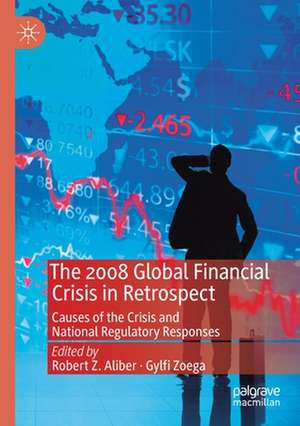The 2008 Global Financial Crisis in Retrospect: Causes of the Crisis and National Regulatory Responses
Editat de Robert Z. Aliber, Gylfi Zoegaen Limba Engleză Paperback – 14 aug 2020
| Toate formatele și edițiile | Preț | Express |
|---|---|---|
| Paperback (1) | 647.08 lei 6-8 săpt. | |
| Springer International Publishing – 14 aug 2020 | 647.08 lei 6-8 săpt. | |
| Hardback (1) | 900.01 lei 6-8 săpt. | |
| Springer International Publishing – 13 iun 2019 | 900.01 lei 6-8 săpt. |
Preț: 647.08 lei
Preț vechi: 761.27 lei
-15% Nou
Puncte Express: 971
Preț estimativ în valută:
123.82€ • 129.62$ • 102.45£
123.82€ • 129.62$ • 102.45£
Carte tipărită la comandă
Livrare economică 05-19 aprilie
Preluare comenzi: 021 569.72.76
Specificații
ISBN-13: 9783030123970
ISBN-10: 3030123979
Pagini: 443
Ilustrații: XVIII, 443 p. 86 illus., 75 illus. in color.
Dimensiuni: 148 x 210 mm
Greutate: 0.6 kg
Ediția:1st ed. 2019
Editura: Springer International Publishing
Colecția Palgrave Macmillan
Locul publicării:Cham, Switzerland
ISBN-10: 3030123979
Pagini: 443
Ilustrații: XVIII, 443 p. 86 illus., 75 illus. in color.
Dimensiuni: 148 x 210 mm
Greutate: 0.6 kg
Ediția:1st ed. 2019
Editura: Springer International Publishing
Colecția Palgrave Macmillan
Locul publicării:Cham, Switzerland
Cuprins
1. A Retrospective on the 2008 Global Financial Crisis- Robert Z Aliber and Gylfi Zoega.- Part I: The Source of the 2008 Global Financial Crisis.- 2. The Financial Alchemy that Failed- Marcus Miller.- 3. Prudential Regulation and Capital Controls- Michael Dooley.- 4. Three Grand State Projects Meet the Financial System- Peter Garber.- 5. The 2008 GFC: Savings or banking glut?- Robert McCauley.- 6. Capital Flows into the United States Ahead of the Great North Atlantic Financial Crisis.- Brad Setser.- 7. The foreign capital flow and domestic drivers of the US financial crisis and its spread globally.- Jeffrey Shafer.- 8. Financial crisis and bank capital- Robert Aliber.- 9. Three Reflections on Banking Regulation and Cross-Border Financial Flows.- Edwin Truman.- Part II: Iceland and the 2008 Global Crisis.- 10. From a Capital Account Surplus to a Current Account Deficit- Gylfi Zoega and Hamid Raza.- 11. The Icelandic banking crisis of 2008: Some exportable lessons”- Gauti Eggertsson, Sigridur Benediktsdottir and Eggert T Thorarinsson.- 12. Iceland’s capital controls.- Fridrik M. Baldursson.- 13. Wages of failure: Compensation schemes of the failed Icelandic banks and subsequent policy responses- Gudrun Johnsen.- 14. Financial policy after the crisis Jon Danielsson.- 15. Business cycles and health: Lessons from the Icelandic economic collapse- Tinna Asgeirsdóttir.- 16. Ten years after: Iceland’s unfinished business.- Thorvaldur Gylfason.- 17. After 100 years of experimenting: One solution?- Asgeir Jonsson.- 18. Iceland should replace its central bank with a currency board- Fredrik NG Andersson and Lars Jonung.- 19. Post-crisis monetary policy reforms in Iceland: Learning the hard way- Thorarinn G. Petursson.- 20. Inflation targeting, capital controls, and currency intervention in Iceland, 2012-2017- Sebastian Edwards.- Part III: Panel Discussion on the 2008 Crisis.- 21. Comments by Robert Z Aliber.- 22. Comments by William White.- 23. Comments by Larry Goodman.
Notă biografică
Robert Z. Aliber received a Bachelor of Arts degree from Williams College (1952) and Bachelor of Arts (1954) and a Master of Arts (1957) from Cambridge University. He received his Ph.D. from Yale University. He has been a staff economist at the Commission on Money and Credit (1959–61) and at the Committee for Economic Development (1961–64). Aliber served as a senior economic advisor at the United States Agency for International Development (1964–65). He was appointed as an associate professor at the University of Chicago in 1964. He is best known for his contribution to the theory of foreign direct investment. He is the author of revised editions of Charles Kindleberger’s Manias, Panics and Crashes(Palgrave Macmillan).
Gylfi Zoega received his first degree at the University of Iceland and a PhD in economics from Columbia University in 1993. He is Professor of Economics at the University of Iceland and Birkbeck College, London, since 1993 and an external member of the Monetary Policy Committee of the Central Bank of Iceland. He has followed the financial crisis in Iceland and taken part in the recovery effort for the past ten years. In addition, he has written a number of academic papers on financial turbulence and capital flows and co-authored the book Preludes to the Icelandic Financial Crash in 2011.
Textul de pe ultima copertă
This book addresses the causes and consequences of the international financial crisis of 2008. A range of esteemed contributors explore developments in the United States, where the crisis of 2008 originated, as well as the smallest country affected, Iceland, by evaluating developments since 2008. Currently, many countries are facing similar problems as Iceland did in 2008: this book is of interest to economists and policy makers in these countries to study what happened in Iceland, and why the recovery of that economy was strong and swift. The chapters in this book originate from panel discussions and conferences and explore areas including regulation, state projects and inflation.
Caracteristici
Contributes to our knowledge about the causes and consequences of financial crises Covers both the genesis of the crisis, effects on other countries and the consequences for the general public in terms of financial hardship and health outcomes Contributors have a range of backgrounds including academic as well as experience in international institutions, central banks and commercial banks
